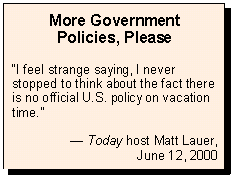 |
||||||||||||||||||||||||
|
||||||||||||||||||||||||
 |
||||||
|
||||||
 |
||||||||||||||||||
|
||||||||||||||||||
 |
|||||||||
|
 |
||||||||||||||||||||||||
|
||||||||||||||||||||||||
 |
||||||||||||||||||||||||
|
||||||||||||||||||||||||
|
What The Media Tell
Americans About Free Enterprise 
NBC News Lends Support To Mandatory Vacation Law Joe Robinson is the editor of Escape, a magazine geared to those who like to travel. The articles advise readers about the fun things there are to do in faraway countries like Vietnam, Panama and Ghana (all of which are profiled in the July issue). Many of Escape’s advertisements are for travel packages to faraway countries like Vietnam, Panama and Ghana.
Here’s some of Robinson’s pitch for mandatory R&R, from Escape’s April issue: "The leading casualty of our sprint to the death is time, that commodity we seemed to have so much of back in sixth grade, when the clock on the wall never moved. Time is the fastener of friendship and family and gives us the space to explore more than the buttons on the snooze alarm. Without it, we’re a nation of strangers, even to those closest to us — and to ourselves. ‘People are spending less time with their family,’ [sic] observes Barry Miller, a career counselor at Pace University in New York. ‘They’re not taking the time to rejuvenate and connect with their family members. Intimate relationships are falling apart. Their relationships with their children are falling apart.’" Yes, yes, we’re all hollow-eyed slaves, victims of our corporate masters and every aspect of our personal lives is falling apart because of our manic pursuit of the almighty dollar. Whatever. Actually, because it is so obviously exaggerated, it’s pretty harmless hyperbole — who would take it seriously? Someone at NBC News, that’s who. NBC deemed "Vacation Deficit Disorder" such a vital, important public policy issue that, last Monday, Robinson’s crusade was featured both on Today and on NBC Nightly News. So there was Joe Robinson, whose favorite travel experience (according to Escape’s web site) was "a rave/riot featuring cannabis-smoking senior citizens in a Tonga village in the sticks of Zimbabwe," chatting labor policy with a sympathetic Matt Lauer during the 7:00 to 7:30 segment of Today on June 12. "Americans are working more and getting less vacation time than people in any other industrialized nation," Lauer proclaimed at the start of his interview. He then confided to his guest that, "I feel strange saying, I never stopped to think about the fact there is no official U.S. policy on vacation time."
Eleven hours later on Nightly News, NBC’s Jim Avila offered a deadly serious "In Depth" segment on America’s need for more leisure time. "It’s called the American work ethic, and some say it could be killing us," Avila warned Nightly News viewers, later adding, "Experts say half of American workers now report stress disorders." Avila also interviewed Robinson ("I think we’re actually in danger of having productivity loss because people are burned out") and then spelled out the amount of paid vacation that workers in other countries receive. "In fact, all of Europe takes nearly a month off per year. From Sweden at 32 days; Spain, Denmark, Austria and France, 30 days; Japan, 25 days; the Swiss take 20 days; Germans 18, and here in the United States, we vacation the least, 16 days a year," said Avila. Japan, of course, is in Asia. Perhaps Mr. Avila needs a vacation. Robinson, in Escape magazine, and Avila on Nightly News, both pointed out that some companies here in the U.S. offer employees vacation packages that are much more generous than the norm, and cited statistics showing that longer vacations mean happier workers, fewer on-the-job mistakes, and less employee turnover. But the conceit of those who advocate a nationwide, government-imposed policy of, as Robinson outlines it, three weeks of paid vacation for all workers with one year on the job, and four weeks for those with more, is amazing. It assumes that every employer can equally handle the disruptions caused when employees take long vacations, and that every employee should prefer the benefit of longer vacation over other types of compensation, such as health benefits or bigger raises. If Robinson is really trying to help his advertisers sell more excursions to Tonga villages in the sticks of Zimbabwe to do Lord knows what, then he’s stumbled upon a clever marketing gimmick. NBC, on the other hand, might want to think twice before jumping on the bandwagon to reinvent America in the image of the higher unemployment and slower growth of the paternalistic economies that populate the European continent. Or, were the grown-ups at NBC all on vacation that week?
Home | News Division
| Bozell Columns | CyberAlerts |
||||




 Of
course, you can’t go to Ghana on a three-day weekend, so Robinson is
embarked on a campaign to give "overworked and underplayed"
Americans more vacation time. Conveniently, he’s found that most of
us suffer from "Vacation Deficit Disorder," and his magazine’s
website has an
Of
course, you can’t go to Ghana on a three-day weekend, so Robinson is
embarked on a campaign to give "overworked and underplayed"
Americans more vacation time. Conveniently, he’s found that most of
us suffer from "Vacation Deficit Disorder," and his magazine’s
website has an
 "I
think a lot of people are surprised about that," Robinson reassured
him. "There is a convention of one to two weeks here, but if you
look at European countries or Australia, it’s mandated by law."
"I
think a lot of people are surprised about that," Robinson reassured
him. "There is a convention of one to two weeks here, but if you
look at European countries or Australia, it’s mandated by law."